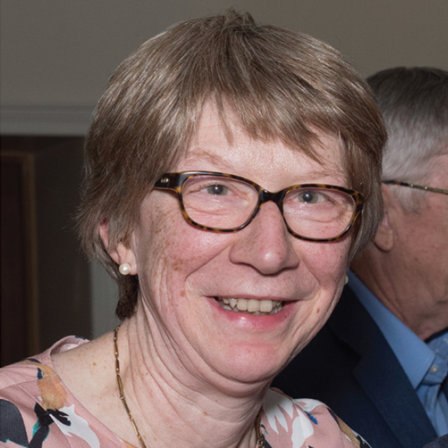In this edition of “Meet the members”, we interview Mary Kearney. She is patient advocate at the ERN since its initiation in 2016. Her work includes research commitment with Tallaght University Hospital, Dublin, teaching commitment with the Irish College of General Practitioners and Clinical commitment in general practice. In this interview, she provides an insight into the importance of patient advocates’ work, her many years of experience in the field of rare neurological diseases, and her expectations of the network.
Please briefly introduce yourself and your hospital.
My name is Mary Kearney, I am a patient advocate at the ERN since its initiation in 2016. My motivation to become involved stems from a personal interest in the rare neurological disease, Friedreich ataxia
Question 1: What is your profession (department, affiliation, etc.) and your medical expertise or specific field of interest/why?
I have a medical background in that I worked as a full-time general practitioner until 2016
Currently, my work includes:
a) Research commitment with Tallaght University Hospital, Dublin which involves the European Friedreich ataxia patient registry which is known as the European Friedreich Ataxia Consortium for Translational Studies (EFACTS). I am also the lead author of a Cochrane review on ‘Pharmacological treatments for Friedreich ataxia since 2010. This review is currently being updated.
b) Teaching commitment with the Irish College of General Practitioners. I organize educational events for my fellow general practitioners to keep them updated on the latest research relevant to general practice
c) Clinical commitment in general practice where I work as a general practitioner with special interest in Headaches
d) Patient advocacy at the European Reference Network for Rare Neurological Diseases (ERN-RND) where I am a volunteer and represent those with ataxia.
Question 2: What do you like most about your work at the ERN-RND and what is the biggest challenge specially in regards to working on rare diseases?
I think it is wonderful to have been the chance to represent people with rare disease. I feel I personally, have a unique view of a rare debilitating disease given the fact that I have personal experience and I am a general practitioner.
Given my experience in general practice, I understand that not ever Dr can know everything about rare diseases and often the important thing for the doctor to be able to do is to access information about rare diseases. I try to communicate this message to those with a rare disease but I am not always successful.
As patient advocates in an ever-changing European environment, it is difficult to assess if we are making a difference. We are asked for our opinion and I do feel it is respected and acted upon. I often feel I am representing general practitioners rather than patients when some issues are discussed. I have occasionally found that neurologists and researchers do not have a clear idea of the role of a general practitioner.
Question 3: How do you participate in ERN-RND? Can you tell us about your experience presenting a case via the CPMS?
As a patient advocate, I am not involved in this area at present. However, as Tallaght University Hospital, Dublin has recently joined the ERN-RND, it is an area I may become involved in. However, given my medical experience and my own personal situation, I feel getting the correct diagnosis for a neurological illness is very important. I have seen several neurological diseases mis-diagnosed. For example, I have seen Friedreich ataxia mis-diagnosed as Multiple Sclerosis; Multiple System Atrophy mis-diagnosed as Dementia.
Question 4: What are your expectations for the network?
I would love to think that rare disease could be cured but realistically, I hope that correct diagnosis can be made for those with neurological disease which make up 19% of all rare diseases.
I am glad to see neurologists, researchers sharing information and making care guidelines available publicly for those with rare diseases
Question 5: How do you think patients and clinicians can work together/why do you think it is important?
I find the clinicians are respective of the patients’ opinion. I often feel by a patient being in the ERN meetings, even if they do not contribute verbally, they are observing and the clinicians are mindful of them being there and considering their work from a patient perspective.
Question 6: What would you wish in terms of educational activities or materials to be offered from ERN-RND, targeting patient advocates like yourself?
I look forward to the planned post graduate qualification in rare diseases and I would be interested in attending some of the sessions. In particular, I would like to understand and know more about genetic testing and how to interpret the results of whole genome sequencing
Is there anything else you would like to say?
As patient advocates, we have been asked to do ‘Patient Journey’ on the specific disease we represent. I feel this has been a worthwhile project as it highlights the difficulties as the patient sees them rather than the difficulties as the neurologist sees. It is a useful educational tool for those with the rare disease. In addition, it is an ideal tool for doctors who are not experts in the area, accident and emergency, general practitioners and other health care professionals.
Are you an ERN-RND full member or affiliated partner and would like to participate? Please contact us.

